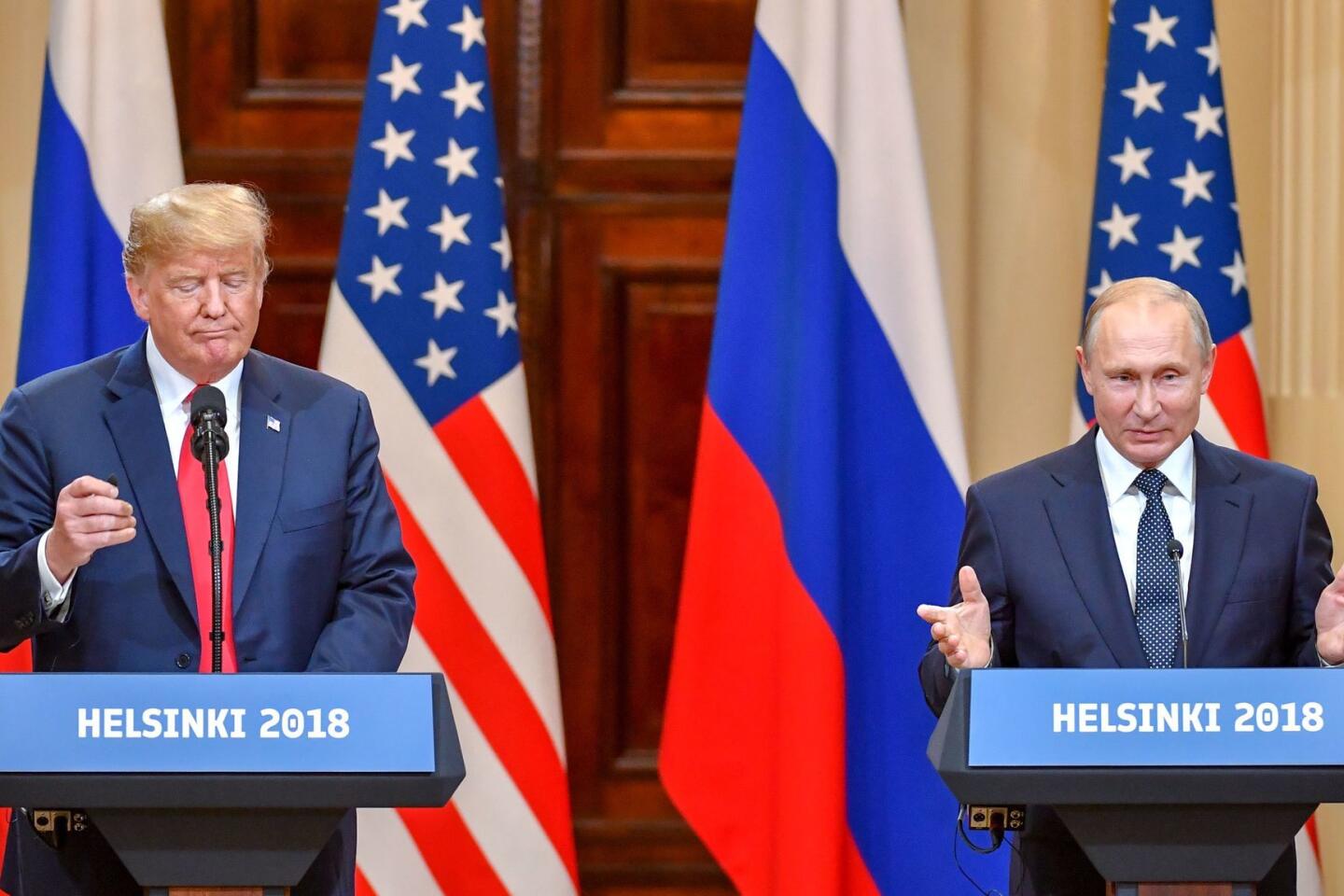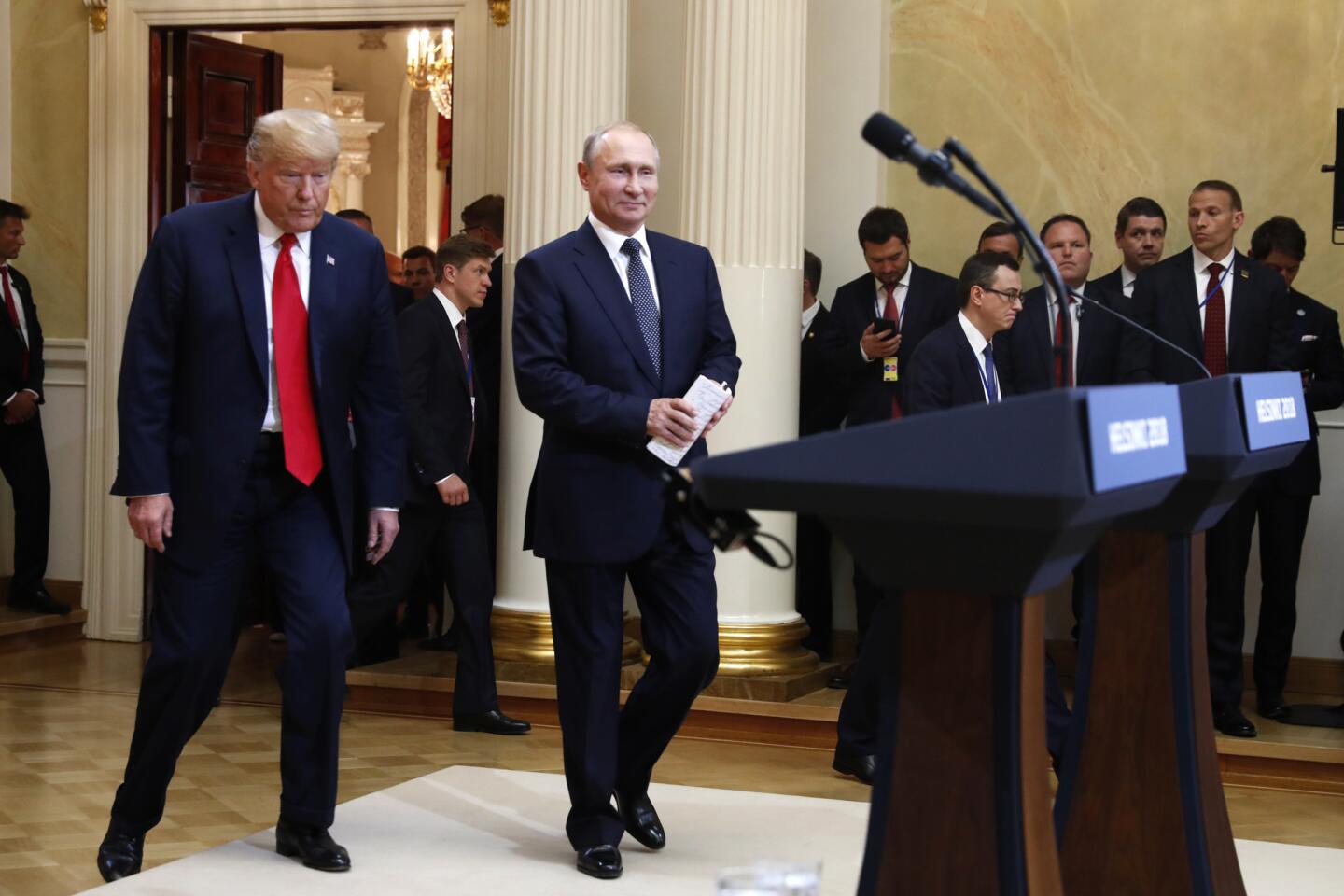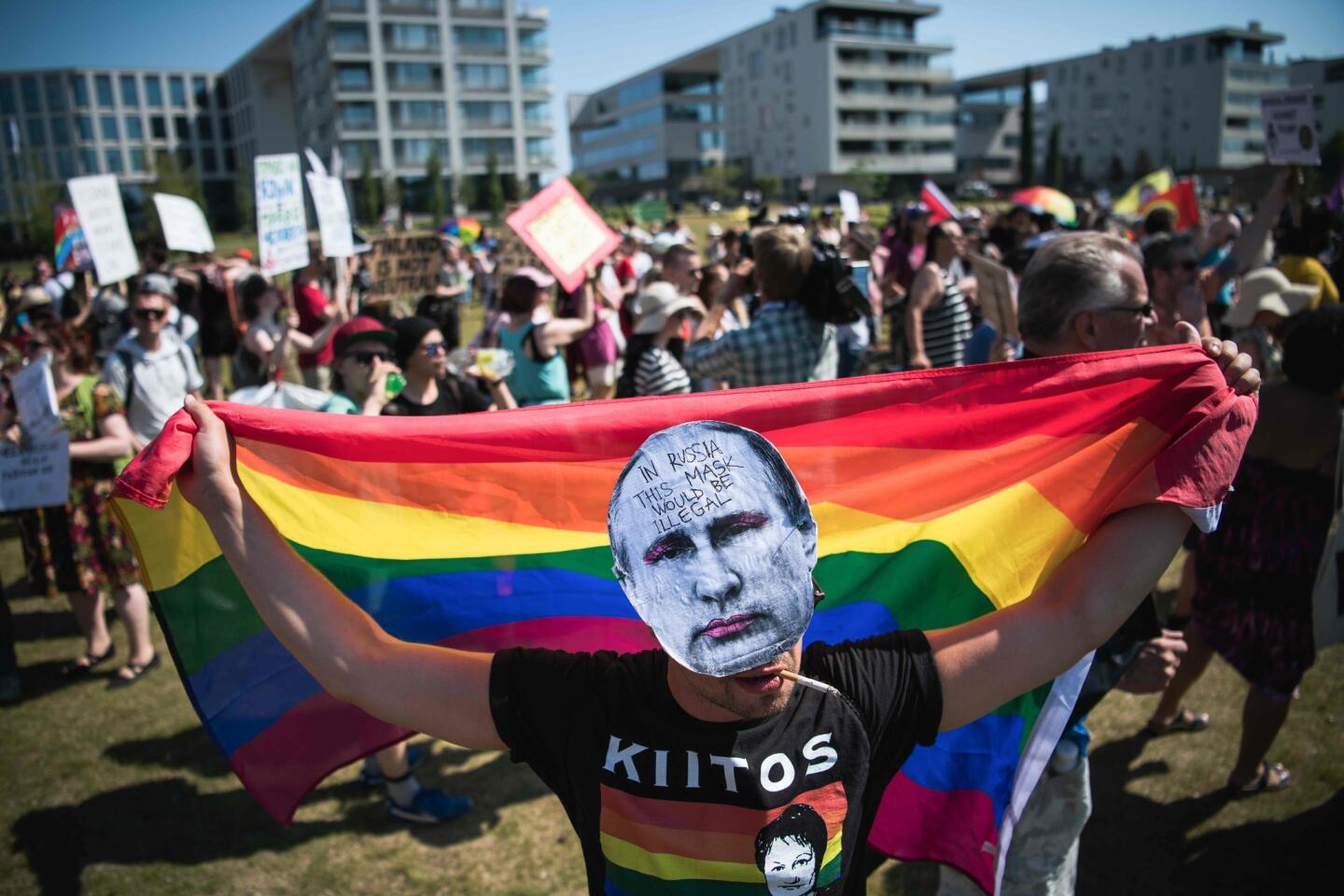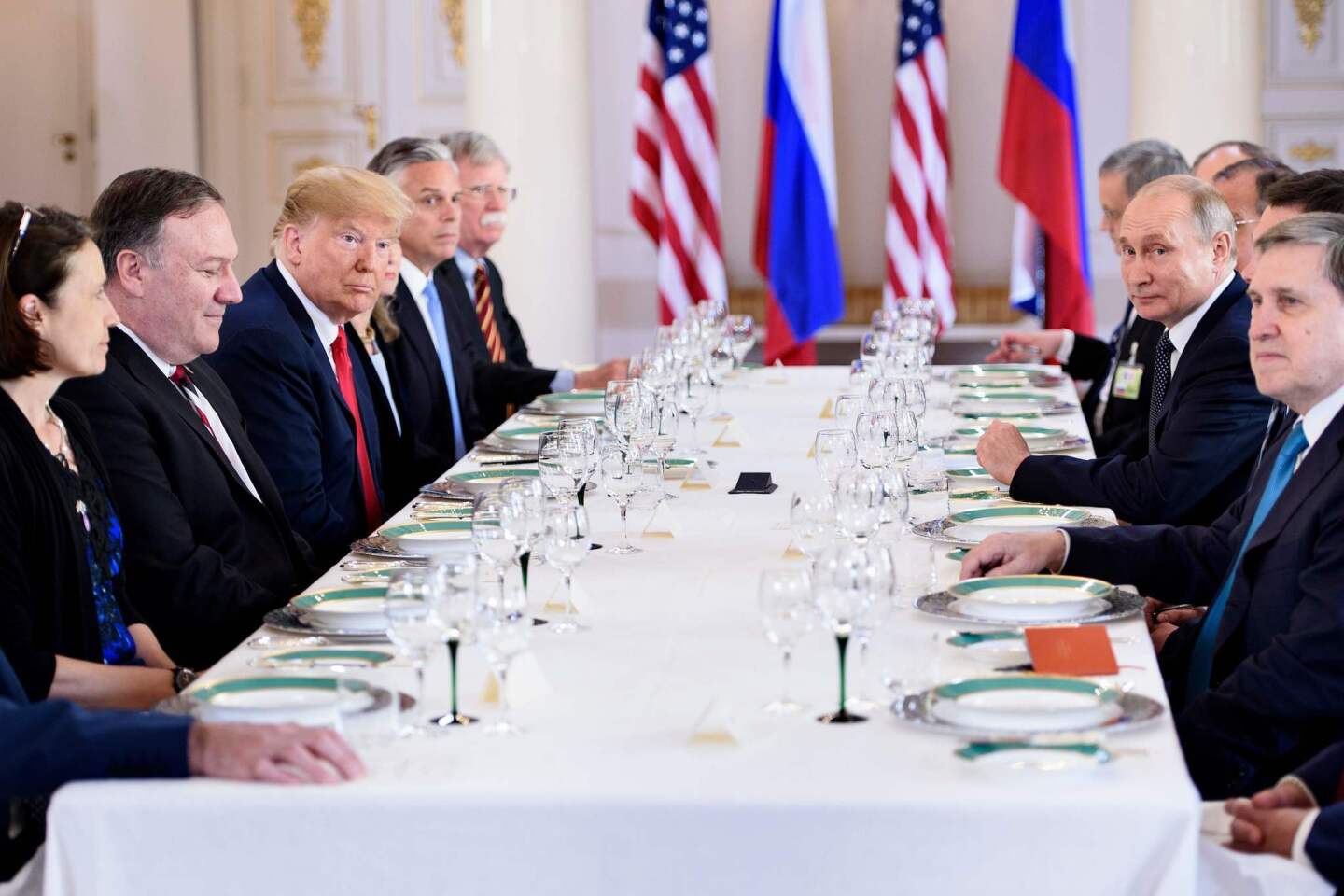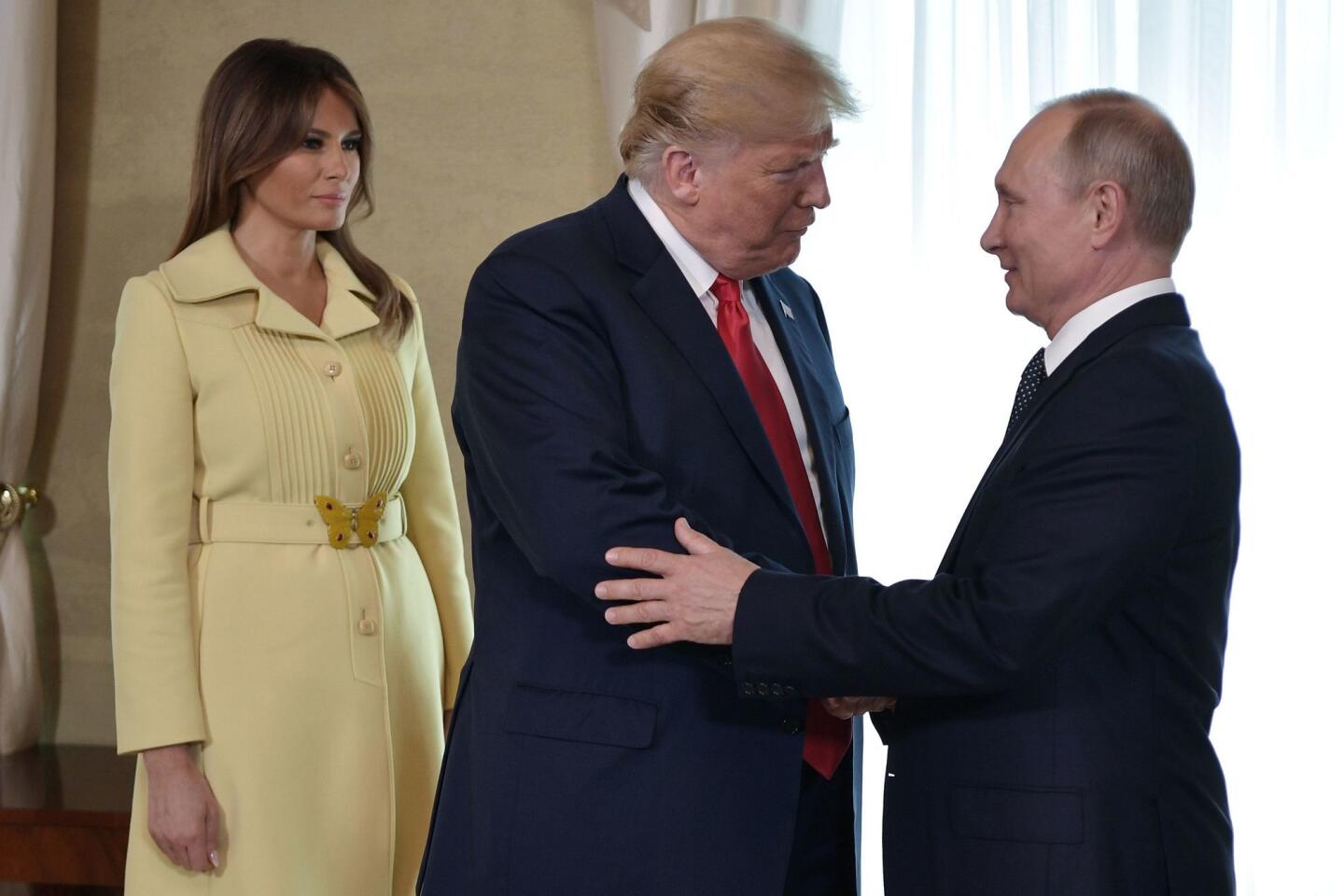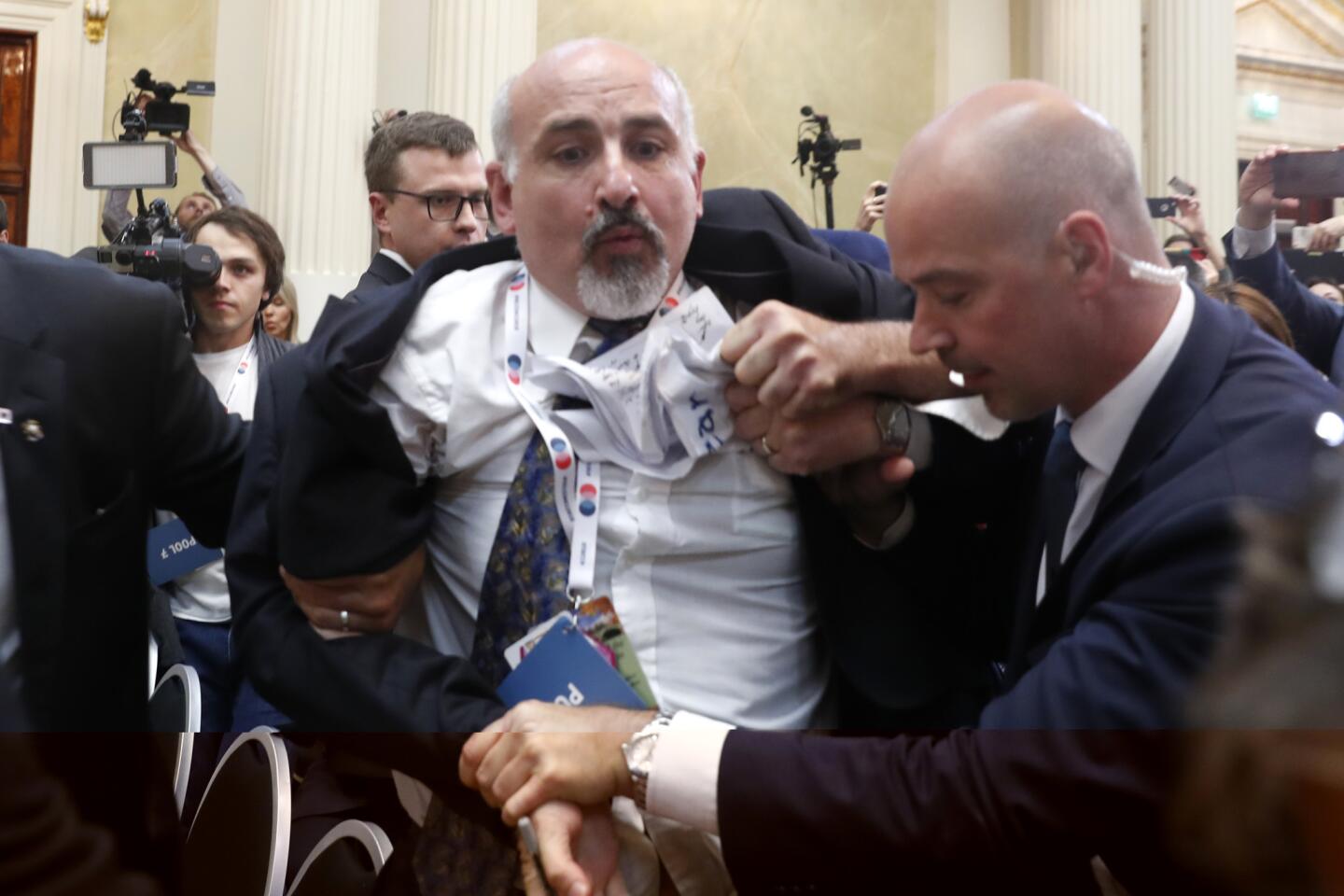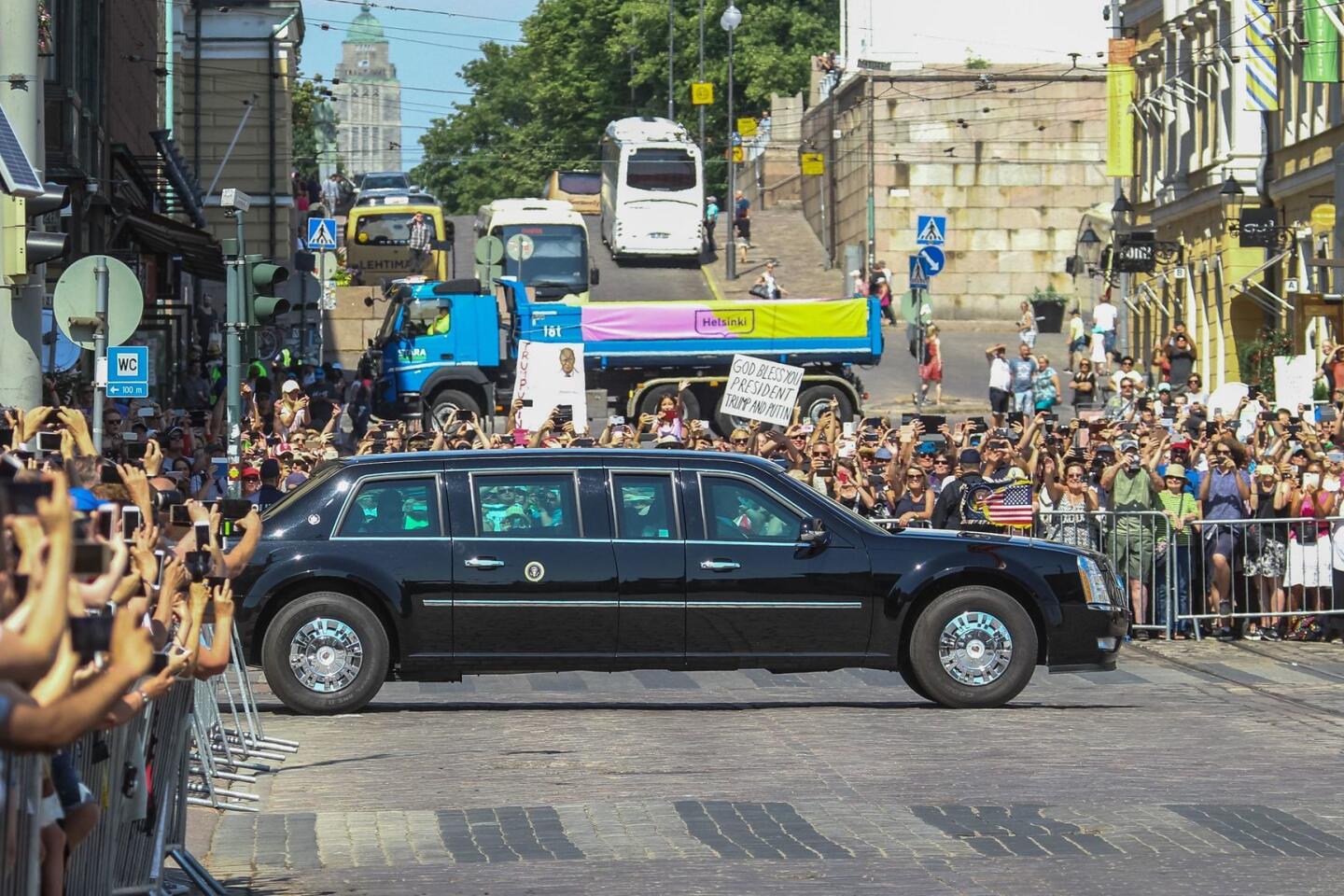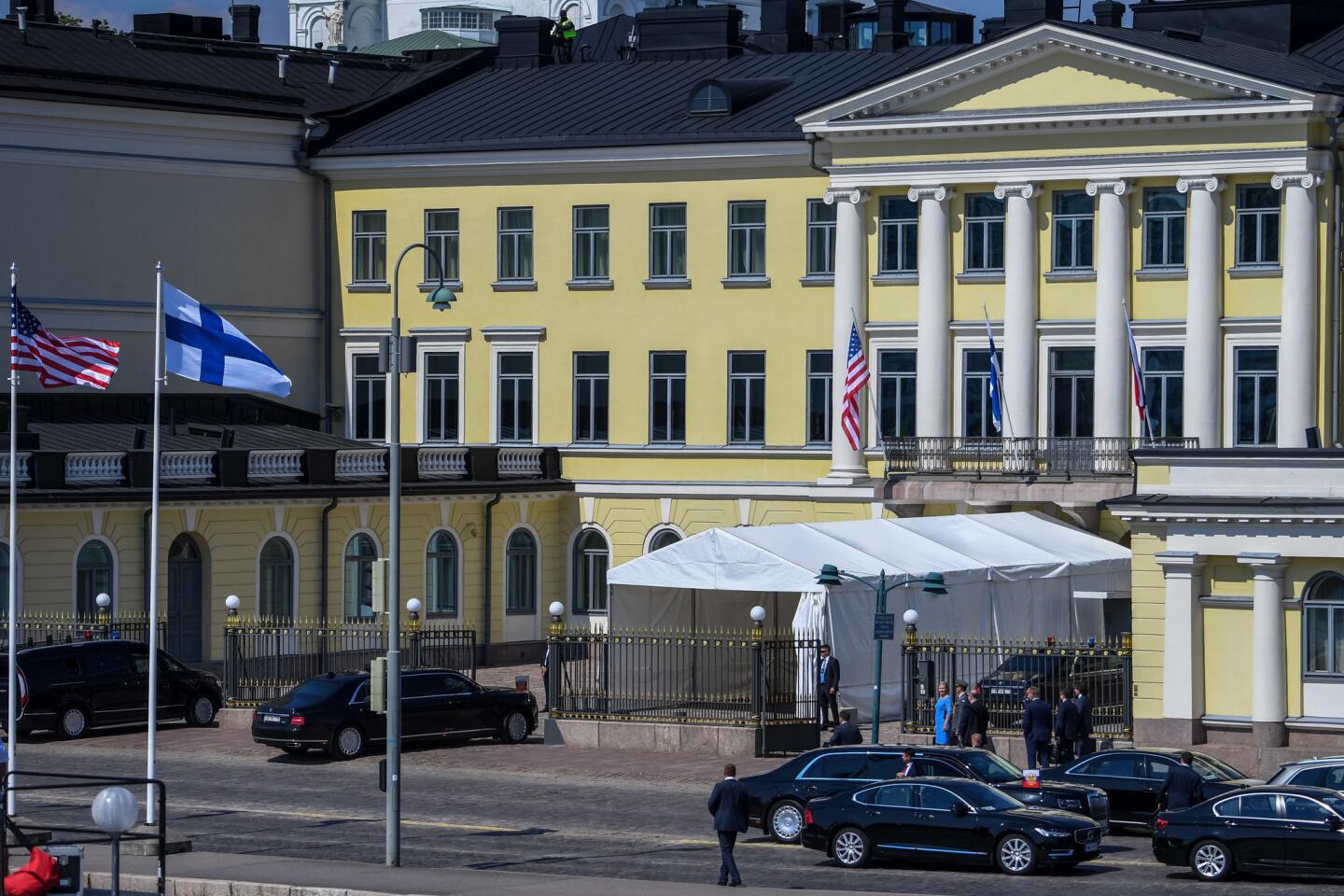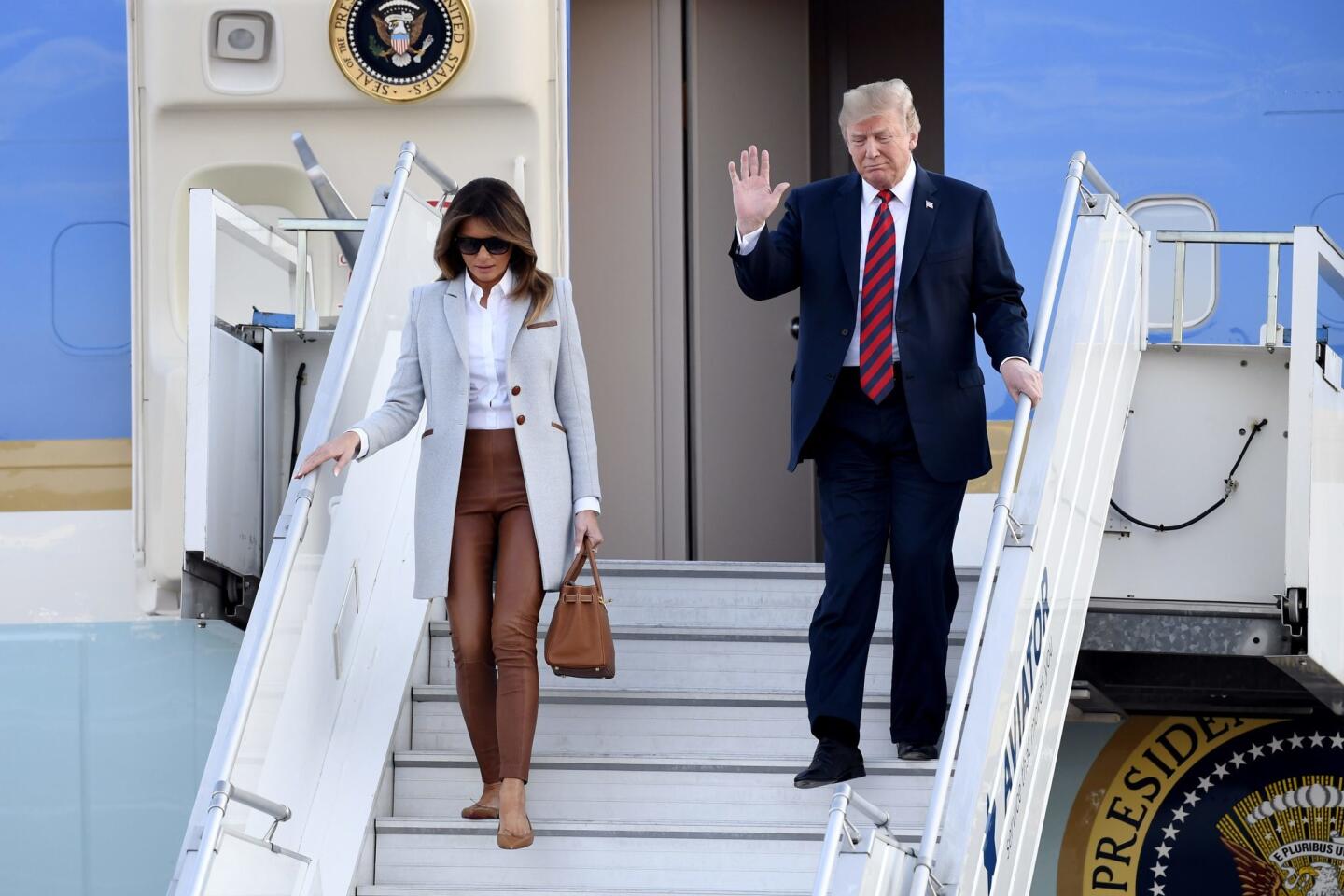Analysis: Sifting through the wreckage of Trump’s Europe tour for signs of a foreign policy
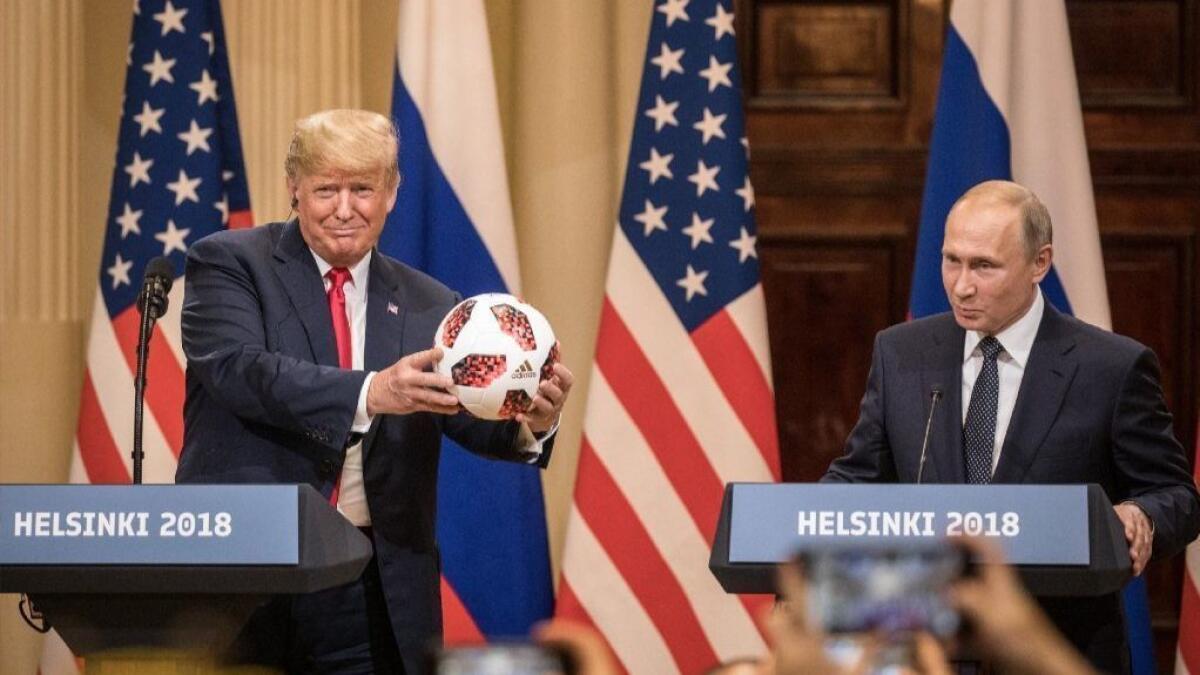
- Share via
Reporting from Washington — Critics already are calling it the “blame America first” tour.
That was perhaps inevitable after President Trump blamed American “foolishness and stupidity” on Monday for the nosedive in U.S. relations with Moscow, not Russia’s aggression in Ukraine, Syria and in the 2016 presidential election.
Later, after an unprecedented two-hour private meeting with Russian President Vladimir Putin, Trump said he didn’t see “any reason why” Russia would meddle in America’s electoral politics, citing Putin’s “strong and powerful” denials, a stunning rebuke to U.S. intelligence and law enforcement agencies.
That followed six days of jaw-dropping presidential taunts aimed at international institutions and alliances that have formed the backbone of U.S. foreign policy and national security for decades, unnerving traditional partners in the North Atlantic Treaty Organization, the European Union and allied capitals around the globe.
The reaction was even more severe in Washington, where Senate Majority Leader Mitch McConnell and House Speaker Paul D. Ryan led a storm of bipartisan complaints that Trump’s budding “bromance” with Putin had seemingly blinded him to Russia’s malign behavior.
Even Trump’s director of national intelligence, Dan Coats, challenged the president for dismissing the conclusions of the U.S. intelligence community, both House and Senate intelligence committees, and two federal indictments that Putin’s government deliberately sought to disrupt America’s last presidential race with hundreds of cyberattacks, phony social media accounts and other tools.
“We have been clear in our assessments of Russian meddling in the 2016 election and their ongoing, pervasive efforts to undermine our democracy,” Coats said in an extraordinary break with the White House. On Friday, Coats had warned that U.S. counterintelligence was “blinking red” with threats of continued Russian cyberattacks, comparing it to the danger signs before the Sept. 11, 2001, terrorist attacks.
Analysts struggled to discern a clear strategy in Trump’s latest unconventional foray into foreign policy. Though some suggested his disruptions sought to shake up and reform ossified international security and trading systems for the 21st century, others saw the raw id of an inexperienced leader in the global spotlight.
Although Trump insisted every stop on his trip produced a success, it probably will be remembered for his threatening to quit NATO if allies didn’t pony up more money; calling Germany a Russian “captive” because of a natural gas pipeline; kneecapping British Prime Minister Theresa May with a derisive interview before they met; slamming the European Union as America’s chief trading “foe” ahead of Russia and China, and more.
“It’s been a week of a degree of calamitous-type events,” said Sen. Bob Corker (R-Tenn), who heads the Senate Foreign Relations Committee.
But Trump’s startling put-down of America before his summit with Putin in Helsinki, Finland — even though he later said “both countries” were at fault — was head-snapping even for Republicans inured to Trump’s steady outpouring of boasts, jibes and falsehoods.
“I disagree with the president’s comments,” said Rep. Ed Royce (R-Fullerton), chairman of the House Foreign Affairs Committee. “There is simply no comparing the actions of the United States and Vladimir Putin.”
“Russia is not our friend,” said Rep. Trey Gowdy (R-S.C.), chairman of the House Oversight Committee and normally one of Trump’s most ardent supporters. He urged Coats and other senior Cabinet members “to communicate to the president it is possible to conclude Russia interfered with our election in 2016 without delegitimizing his electoral success.”
After they met, Trump and Putin announced no agreements or even progress on Ukraine, Syria, Afghanistan, nuclear arms control, or on stopping harassment of U.S. diplomatic personnel in Moscow, major areas of U.S. concern. It wasn’t clear whether Trump got anything beyond a World Cup soccer ball, a gift from Putin.
Nor did they disclose any U.S. concessions, including easing economic sanctions on Moscow or removing U.S. troops from Syria or Europe, which Putin long has sought. Whether they were offered during the leaders’ private meeting is unknown.
Instead, their joint news conference became another venue for Trump to praise the Russian strongman, boast about his own electoral victory, and lash out at Democrats and the special counsel investigation that last week indicted a dozen Russian intelligence officers for hacking Democratic Party computers during the 2016 campaign.
“The message he is sending is that … allies are more dangerous than adversaries,” said Thomas Wright, director of the Center on the United States and Europe at the Brookings Institution, a nonpartisan think tank in Washington.
“We are operating in a world without safety rails,” he added.
Trump’s affinity for strongmen and his dismissive attitude toward NATO is a “gift” to Putin and Chinese President Xi Jinping, said William Burns, president of the Carnegie Endowment for International Peace and a former deputy secretary of State.
“It’s reflective of his worldview, that the world should be run by big guys, big powers, that might makes right,” said Burns, a former U.S. ambassador to Russia. “There’s also a bit of Putin envy,” he added.
Trump has expressed similar praise for North Korean dictator Kim Jong Un, who runs a police state, and Turkey’s authoritarian leader, Recep Tayyip Erdogan, who has jailed tens of thousands of his opponents, noted Ojars Eriks Kalnins, a former Latvian ambassador to the U.S., during a seminar Monday in Washington on Russian election interference.
“He likes leaders who don’t need to be accountable to their voters,” Kalnins said.
Trump increasingly appears at odds with parts of his own administration when it comes to Russia.
Though he has suggested he might recognize Russia’s seizure of Crimea, for example, his administration has supplied anti-tank rockets to the government in Kiev, expanding U.S. support for Ukraine in its battle with Moscow.
Similarly, the administration has formally backed Britain’s claims that Moscow was almost certainly to blame for a chemical toxin attack against a former Russian spy living in England.
But Trump has been slow to punish Moscow. In March, the administration announced new sanctions on Russia — but they fell well short of the penalties Congress had approved nearly unanimously last year, and focused on a narrow list of targets.
Trump’s advisors and aides sometimes urge foreign leaders to watch what he does, not what he tweets, arguing that there is purpose under the bluster.
“His negotiating style is always to leave the other guy an off-ramp,” said James Carafano, a senior analyst at the conservative Heritage Foundation, which has advised the administration.
“Sometimes he is very effusive and that can come off as being off-putting,” he said. But it can be an effective negotiating technique to change an adversary’s behavior, he added.
Sen. Marco Rubio (R-Fla.), a hawk on foreign policy who is generally supportive of Trump, said the president may have miscalculated with Putin, however.
“All I can speculate is that there is an effort to figure out if by being nice to Vladimir Putin there is a way we can establish a better working relationship,” Rubio said. “The flaw in that, which I think goes to the heart of this very issue, is that Vladimir Putin is not interested in a better working relationship with the United States.”
Times staff writer Chris Megerian contributed to this report.
For more on international affairs, follow @TracyKWilkinson on Twitter
More to Read
Sign up for Essential California
The most important California stories and recommendations in your inbox every morning.
You may occasionally receive promotional content from the Los Angeles Times.
